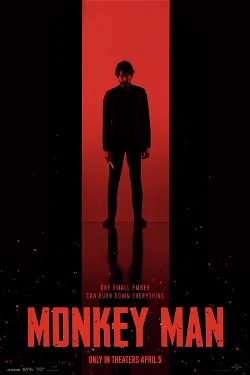
Dev Patel’s Monkey Man, a low-budget, high-octane action thriller with a dash of social commentary, has finally been released. This is Patel’s first film, following a successful acting career with films like Slumdog Millionaire (2008), Lion (2016), and The Green Knight (2021). In addition to directing, Patel also wrote, produced, and starred in the film.
Monkey Man had a long and tumultuous journey before its theatrical release. In 2018, the film began life as an independent production. Progress was slow and made even worse by the onset of the pandemic in 2020. In 2021, Netflix purchased the rights to the movie, only to drop it sometime later, citing concerns with its gritty tone and divisive subject matter. Horror director Jordan Peele was the project’s saving grace, stepping on as producer and securing a deal with Universal Pictures to distribute the film theatrically.
Despite its humble beginnings, Monkey Man has already been a significant success. Opening behind Godzilla x Kong: The New Empire, the film has already grossed over $12 million on a $10 million budget. Although, given the arduous production, it’s unclear how much the film will need to gross in order to make a profit.
Patel, who co-wrote the screenplay with Paul Angunawela and John Collee, has spoken about how he wanted to make Monkey Man something special. And by all measures, he did it, by blending slick action with scathing social commentary, Patel has created something totally unique in the action genre.
Unfortunately, when it comes to addressing large-scale societal issues, the film’s reach sometimes exceeds its grasp. Monkey Man attempts to cover wealth disparity, transphobia, the weaponization and commercialization of religion, and a litany of other issues all in two hours. While it does an admirable job and manages to say something about every subject it covers, the film often fails to go deeper than surface level. By the end, however, the film draws everything to a satisfying thematic conclusion, making an inspiring statement about taking action to secure freedom in the face of adversity.
The plot of Monkey Man, while being fairly formulaic, remains interesting throughout, serving as an engine to deliver the film’s message and set the stage for various action scenes. The nameless protagonist, played by Patel, is set apart from other action heroes, in that he doesn’t have years of special training, or possess superhuman abilities that set him above and beyond his enemies. He is always the underdog and has to fight tooth and nail to survive. He is essentially an everyman, which makes his journey from a broken man seeking revenge to a hero fighting for a noble cause all the more satisfying to watch.
Of course, the plot is only one half of the equation, the other, and arguably more important piece, is the action, and there’s less of it than you might expect. The large action set pieces are few and far between, which gives the story time to breathe. But when the fighting starts, is when Monkey Man really shines. The choreography is tight and dynamic, the action is desperate, brutal, and always stylish.
And speaking of style, Monkey Man has it in spades. By combining the best aspects of Hollywood and Bollywood films, Monkey Man has a wholly unique style that is equal parts John Wick, and RRR. There’s a certain fluidity to the way the action unfolds that makes Monkey Man a joy to watch. Especially noteworthy is the cinematography, done by Sharone Meir, which plays with the frame in creative ways, making every shot unique and interesting.
Much like his character in the film, Patel has overcome the challenges laid before him and has established himself as a capable director with a unique voice. And Monkey Man is a testament to the freshman director’s abilities.







